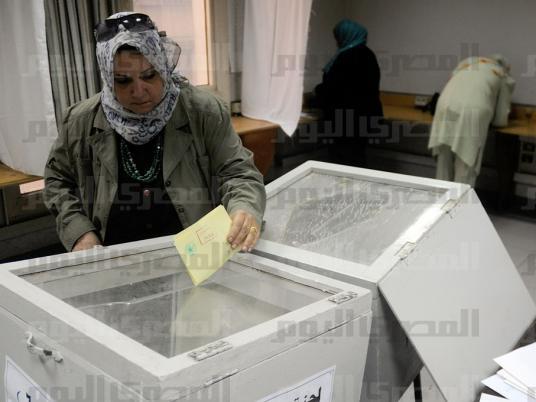 Head of the Ahram Center for Political and Strategic Studies Diaa Rashwan won the seat of the head of the Journalists Syndicate in elections held on Friday.
Head of the Ahram Center for Political and Strategic Studies Diaa Rashwan won the seat of the head of the Journalists Syndicate in elections held on Friday.
“The syndicate stood against repression,” he said after the votes were counted. “And oppressive regimes have fallen while the syndicate is still here.”
Rashwan got more than 50 percent of the votes, beating the other main frontrunner, Abdel Mohsen Salama, the managing editor of Al-Ahram newspaper.
After being postponed for two weeks for failing to reach quorum, elections for the head of the press syndicate and six of the 12 board members were held among hopes that the next board would distance itself from political bias which caused the failure of outgoing syndicate head Mamdouh al-Wali, known for his affiliation to the Muslim Brotherhood.
The six board members elected are Karem Mahmoud of the privately-owned Tahrir daily, Alaa Thabet, formerly associated with one of Al-Ahram's publications, Osama Dawoud of the Nasserite Al-Araby newspaper, Gamal Abdel Rehim of the state-run Al-Gomhurriya newspaper, Hanan Fekry of the Coptic Watany newspaper and Khaled al-Balshy of the leftist-leaning Al-Bedaya website.
While campaigners holding banners and giving out flowers filled the tent set up in front of the syndicate for voters to register, the turnout was weak, reaching the quorum of 25 percent plus one of eligible voters only minutes before the 3 pm deadline.
After the original quorum of 50 percent plus one was not reached two weeks ago, the elections were postponed and the quorum revised, as laid out by the law.
Doreya Kamal, a journalist in Akhbar Al-Youm who was in the syndicate casting her vote on Friday, says that with both frontrunners from the same camp, the fierce battle between the state and opposition which used to be the main drive for the elections is not there anymore, which could explain the low turnout.
“What intensified the battle throughout the history of the syndicate was the fierce competition between the government and the opposition, which encouraged journalists to participate. The absence of this battle has dampened the enthusiasm,” she says.
But Balshy, who just won a seat on the board, says that a closer look reveals that the competition between the two camps is still at play.
“The competition is still between the government and the opposition but not with the same intensity as before. Despite appearances, one candidate is on the edge of the opposition and the other is on the edge of the regime,” says Balshy.
Despite belonging to the same institution, as a staunch critic of the Brotherhood, Rashwan is known to be closer to the opposition, while Salama has a reputation as a regime loyalist. Rashwan lost in the syndicate elections back in 2009, when a Mubarak regime loyalist made it to the post.
As the percentage of journalists in the General Assembly working for private papers grows, Balshy suggests, the history of state institutions dominating the elections may be broken in future elections.
Doreya al-Malatawy, journalist at state magazine Sabah Al-Kheir, hopes that politics will be left out of the syndicate this time around.
“I hope that the press syndicate becomes more inclined toward servicing journalists. For years each camp used it for its own interests and it was not for journalists,” says Malatawy. “We want it to look out for the interests of journalists and not offer trips or a fridges or whatever,” she adds.
Offering services has always been one of the main campaigning tactics in the syndicate elections, but the frontrunners this time around promised more.
Rashwan’s slogan promised journalists dignity while Salama’s promised a syndicate for all journalists.
Those voting for Rashwan cite his political affiliations as a voice of opposition to the Muslim Brotherhood. Salama’s supporters argue that he has more journalistic experience and is more capable of relating to the problems of journalists in comparison to Rashwan whose experience is more academic.
Some of the most revolutionary members of the syndicate however are not happy with either option. Rasha Azzab, journalist at Al-Fagr newspaper, boycotted the syndicate elections, deeming Rashwan too close to the military institution and Salama too close to the regime.
“I will write the name of Al Husseiny Abu Daif in the ballot,” she said before the elections. Abu Daif, also a journalist for Al-Fagr, was killed in December while covering clashes at the presidential palace between Brotherhood members and their opposition.
Abeer Saady, the current deputy of the syndicate whose term continues for two more years, says that the syndicate is at an important juncture in its history.
“The syndicate now is at stake, it could either thrive or be doomed,” she says.
While she sees the early elections as an opportunity to turn the syndicate around, she says that there are also looming threats.
“The problem is that the General Assembly acts as if it has elected angels and disappears from the scene after elections day. The solution is for the General Assembly to constantly monitor whoever they elect for the board,” she says.
Syndicate Undersecretary Gamal Fahmy says that while the loyalty of the outgoing head of the syndicate to the Muslim Brotherhood handicapped the past board, he trusts the General Assembly to have the awareness to elect a council capable to fight what he calls the most dangerous battle in the history of the syndicate against the Brotherhood’s attempts to restrain press freedoms.
“The diversity of the journalists sphere has always been one of its advantages that we’re proud of and it will make for a diverse board where no political affiliation can monopolize power,” he says.



